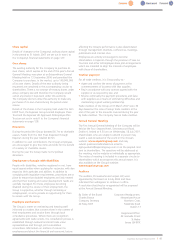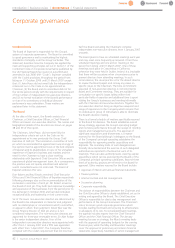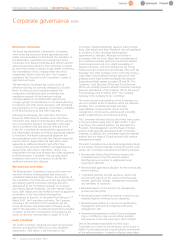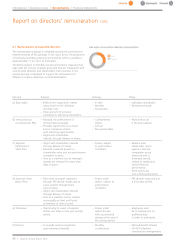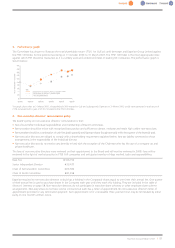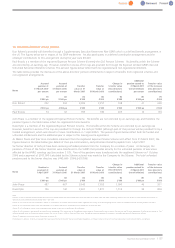Experian 2007 Annual Report Download - page 49
Download and view the complete annual report
Please find page 49 of the 2007 Experian annual report below. You can navigate through the pages in the report by either clicking on the pages listed below, or by using the keyword search tool below to find specific information within the annual report.
Experian Annual Report 2007 |47
Report on directors’ remuneration
1. Remuneration Committee
1.1 Role
The Remuneration Committee has responsibility for:
•recommending Experian’s policy on the remuneration of Senior Management;
•determining the remuneration level and structure for executive directors and approving that of selected executives who report to the
executive directors;
•communicating to shareholders on remuneration policy and the Committee’s work on behalf of the Board;
•reviewing and recommending the design of the Group’s share schemes.
The remuneration of non-executive directors and the Chairman is a matter reserved for the Board as a whole. No director is involved in any
discussions as to his or her own remuneration.
The Remuneration Committee has written terms of reference which are available on request from the Company Secretary and are also
published on the Group’s website www.experiangroup.com.
1.2 Membership and meetings
Since the date of demerger of GUS plc, the Remuneration Committee has comprised the following non-executive directors:
Roger Davis (Chairman, appointed 1 January 2007)
Fabiola Arredondo (appointed 1 January 2007)
Laurence Danon (appointed 1 January 2007)
Alan Jebson (appointed 1 January2007)
Sir Alan Rudge (appointed 6 September 2006)
David Tyler (appointed 6 July 2006)
Sean FitzPatrick joined the Committee from 1 April 2007, his date of appointment.
In the period from listing on 11 October 2006 to 31 March 2007, the Committee has met twice. Attendance at these meetings is set out in
the corporate governance statement on page 43.
1.3 Advisers
In making its decisions, the Committee consults with the Chairman, the Chief Executive Officer, the Group HR Director and the Global
Head of Reward who are invited to attend meetings of the Committee as and when appropriate. They are not permitted to participate in
discussions or decisions relating to their own remuneration.
The Committee has access to independent consultants to ensure that it receives independent advice.
Towers Perrin, Kepler Associates (Kepler) and Linklaters have been the principal advisers to the Committee in the period under review
providing market information and general remuneration advice.
Afull list of the advisers who provided data or consulting services to the Committee during the year, together with details of other services
provided by them to the Company, can be found on the Experian website.
2. Remuneration policy
The Remuneration Committee of GUS plc reviewed the remuneration policy for executive directors prior to the demerger of the Company.
The Remuneration Committee of Experian Group Limited has determined that the policy remains appropriate for the coming year.The
remuneration policy will be regularly reviewed by the Committee.
The Remuneration Committee aims to have in place a remuneration policy for the Company which is consistent with its business objectives,
and which can:
1. pay market-competitive base salary levels but no higher than this;
2. provide competitive performance-related compensation which influences performance, and helps attract and retain executives by
providing the opportunity to earn substantial rewards for outstanding performance leading to long-term shareholder value;
3. apply demanding performance conditions to deliver sustained profitable growth in all our businesses, thereby aligning incentives to
shareholders’ interests;
4. provide a balanced portfolio of incentives - bonus, options and shares which align both short term (one year) and longer term (three
years plus) performance such that sustainable growth and value are delivered;
5. provide accountability and transparency and align with the interests of shareholders;
6. deliver competitive benefits to underpin the other components of the remuneration package.
Consistent with the policy,the Committee reviews the elements of the remuneration package relative to other comparable organisations
and other companies of similar size and scope to Experian. Performance-related incentives aretargeted at upper quartile levels for
outstanding performance to produce a highly leveraged package if the Company’s growth objectives are attained. The Company is
committed to performance-related pay at all levels within the organisation. All employees areencouraged to participate as shareholders in
the Company.






